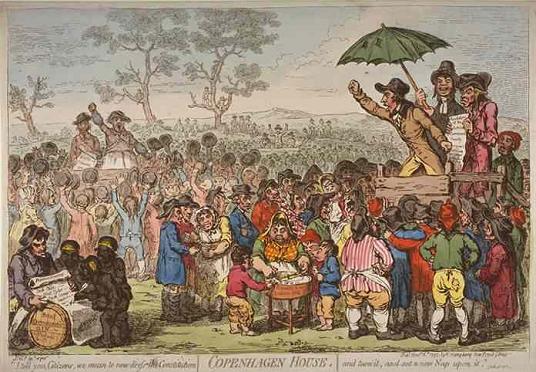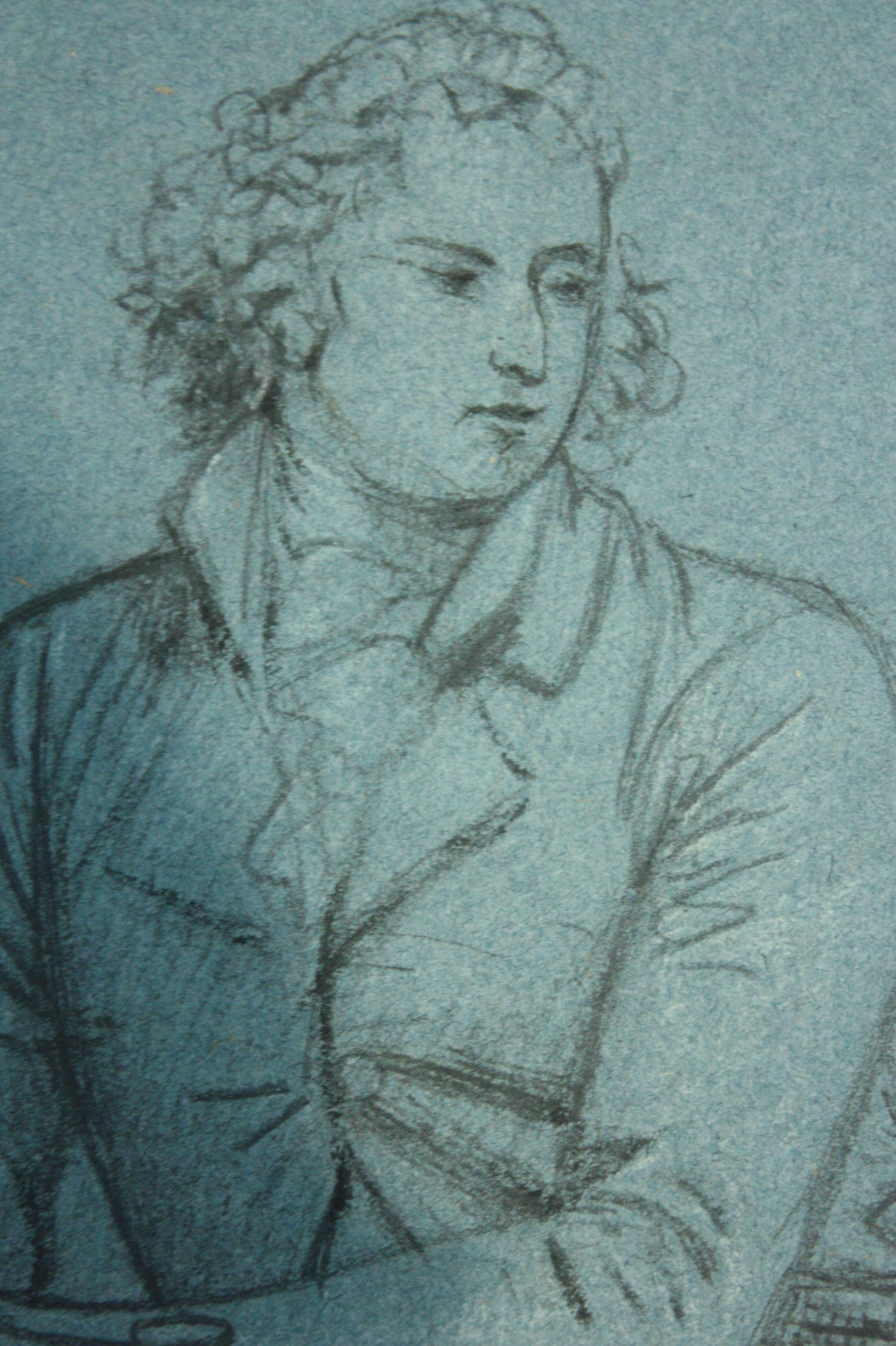|
Felix Vaughan
Felix Vaughan (7 March 1766 – 22 April 1799) was an English barrister, known for his role as defence counsel in the treason trials of the 1790s. Early life The son of Samuel Vaughan of Middlesex, a tradesman, he was baptised at Westminster St James on 20 March 1766, and educated at Harrow School and Stanmore, where he was briefly a pupil of Samuel Parr, who became a lifelong friend, as did Basil William Douglas, Lord Daer, a schoolfellow, son of Dunbar Douglas, 4th Earl of Selkirk. He was admitted to the Inner Temple in 1785. He entered Jesus College, Cambridge as a fellow-commoner in 1786, graduating B.A. in 1790 and M.A. in 1794. Vaughan was in France and Geneva in 1790–1. He corresponded from the continent with John Richter and William Frend. Opponent of the Pitt clampdown Back in England, Vaughan was part of the London radical milieu including James Losh; also one of the group dining with John Horne Tooke. He was called to the bar in 1792. In spring of that year he was ... [...More Info...] [...Related Items...] OR: [Wikipedia] [Google] [Baidu] |
Barrister
A barrister is a type of lawyer in common law jurisdictions. Barristers mostly specialise in courtroom advocacy and litigation. Their tasks include taking cases in superior courts and tribunals, drafting legal pleadings, researching law and giving expert legal opinions. Barristers are distinguished from both solicitors and chartered legal executives, who have more direct access to clients, and may do transactional legal work. It is mainly barristers who are appointed as judges, and they are rarely hired by clients directly. In some legal systems, including those of Scotland, South Africa, Scandinavia, Pakistan, India, Bangladesh, and the British Crown dependencies of Jersey, Guernsey and the Isle of Man, the word ''barrister'' is also regarded as an honorific title. In a few jurisdictions, barristers are usually forbidden from "conducting" litigation, and can only act on the instructions of a solicitor, and increasingly - chartered legal executives, who perform tasks such ... [...More Info...] [...Related Items...] OR: [Wikipedia] [Google] [Baidu] |
Knutsford
Knutsford () is a market town in the borough of Cheshire East, in Cheshire, England. Knutsford is south-west of Manchester, north-west of Macclesfield and 12.5 miles (20 km) south-east of Warrington. The population at the 2011 Census was 13,191. Knutsford's main town centre streets, Princess Street (also known locally as Top Street) and King Street lower down (also known as Bottom Street), form the hub of the town. At one end of the narrow King Street is an entrance to Tatton Park. The Tatton estate was home to the Egerton family, and has given its name to Tatton parliamentary constituency, which includes the neighbouring communities of Alderley Edge and Wilmslow. Knutsford is near Cheshire's Golden Triangle, and on the Cheshire Plain between the Peak District to the east and the Welsh mountains to the west. Residents include ''Coronation Street'' actress Barbara Knox and footballers Peter Crouch, Sam Ricketts, Michael Jacobs and Phil Jagielka. History Knutsford, ... [...More Info...] [...Related Items...] OR: [Wikipedia] [Google] [Baidu] |
Lancaster, Lancashire
Lancaster (, ) is a city and the county town of Lancashire, England, standing on the River Lune. Its population of 52,234 compares with one of 138,375 in the wider City of Lancaster local government district. The House of Lancaster was a branch of the English royal family. The Duchy of Lancaster still holds large estates on behalf of Charles III, who is also Duke of Lancaster. Its long history is marked by Lancaster Castle, Lancaster Priory Church, Lancaster Cathedral and the Ashton Memorial. It is the seat of Lancaster University and has a campus of the University of Cumbria. The Port of Lancaster played a big role in the city's growth, but for many years the outport of Glasson Dock has become the main shipping facility. History The name of the city first appeared in the Domesday Book of 1086, as ''Loncastre'', where "Lon" refers to the River Lune and "castre" (from the Old English ''cæster'' and Latin ''castrum'' for "fort") to the Roman fort that stood on the site. Ro ... [...More Info...] [...Related Items...] OR: [Wikipedia] [Google] [Baidu] |
Thomas Walker (merchant)
Thomas Walker (1749–1817) was an English cotton merchant and political radical. Life He was the son of Thomas Walker, a merchant in Bristol who moved to Manchester. An early influence was the teaching of James Burgh. He became a Manchester cotton merchant himself. He had a town house and warehouse on South Parade, adjacent to St Mary's Church, Manchester, and a country place at Barlow Hall, rented from William Egerton. Business campaigns In 1784 Walker led the successful local opposition to William Pitt's fustian tax. With Thomas Richardson, he testified to the Board of Trade committee in London in January 1785. After some confusion during the spring, the House of Commons voted to repeal the tax in April, and the Manchester men returned north as heroes. The same year he founded the General Chamber of Manufactures, set up to lobby against Pitt's measures on trade with Ireland. In 1787 Walker opposed the Eden Treaty, a divisive position. In 1788, at a meeting of fustian manufa ... [...More Info...] [...Related Items...] OR: [Wikipedia] [Google] [Baidu] |
Freedom Of The Press
Freedom of the press or freedom of the media is the fundamental principle that communication and expression through various media, including printed and electronic News media, media, especially publication, published materials, should be considered a right to be exercised freely. Such freedom implies the absence of interference from an overreaching State (polity), state; its preservation may be sought through constitution or other legal protection and security. Without respect to governmental information, any government may distinguish which materials are public or protected from disclosure to the public. State materials are protected due to either one of two reasons: the classified information, classification of information as sensitive, classified or secret, or the relevance of the information to protecting the national interest. Many governments are also subject to "sunshine laws" or freedom of information legislation that are used to define the ambit of national interest and ... [...More Info...] [...Related Items...] OR: [Wikipedia] [Google] [Baidu] |
John Thelwall
John Thelwall (27 July 1764 – 17 February 1834) was a radical British orator, writer, political reformer, journalist, poet, elocutionist and speech therapist.Thelwall, John (1764-1834) english-heritage.org.uk. Retrieved 30 May 2019. Life  Thelwall was born in , London, but was descended from a Welsh family which had its seat at Plas y Ward,
Thelwall was born in , London, but was descended from a Welsh family which had its seat at Plas y Ward,
|
Daniel Isaac Eaton , a radical lecturer and debater: Thelwall had made a speech that included an anecdote about a tyrannical gamecock named "King Chanticleer". Eaton was imprisoned for three months before his trial in an effort to bankrupt him and his family. In February 1794, he was finally brought to trial and defended by John Gurney: he was acquitted.
Daniel Isaac Eaton (1753–1814) was an English radical author, publisher and activist. He was tried eight times for selling radical literature and convicted in 1812 for selling ''The Age of Reason''. Eaton was the publisher of the popular periodical '' Politics for the People'' and was arrested on 7 December 1793 for publishing a statement by John Thelwall John Thelwall (27 July 1764 – 17 February 1834) was a radical British orator, writer, political reformer, journalist, poet, elocutionist and speech therapist. [...More Info...] [...Related Items...] OR: [Wikipedia] [Google] [Baidu] |
Internet Archive
The Internet Archive is an American digital library with the stated mission of "universal access to all knowledge". It provides free public access to collections of digitized materials, including websites, software applications/games, music, movies/videos, moving images, and millions of books. In addition to its archiving function, the Archive is an activist organization, advocating a free and open Internet. , the Internet Archive holds over 35 million books and texts, 8.5 million movies, videos and TV shows, 894 thousand software programs, 14 million audio files, 4.4 million images, 2.4 million TV clips, 241 thousand concerts, and over 734 billion web pages in the Wayback Machine. The Internet Archive allows the public to upload and download digital material to its data cluster, but the bulk of its data is collected automatically by its web crawlers, which work to preserve as much of the public web as possible. Its web archiving, web archive, the Wayback Machine, contains hu ... [...More Info...] [...Related Items...] OR: [Wikipedia] [Google] [Baidu] |
Joseph Priestley
Joseph Priestley (; 24 March 1733 – 6 February 1804) was an English chemist, natural philosopher, separatist theologian, grammarian, multi-subject educator, and liberal political theorist. He published over 150 works, and conducted experiments in electricity and other areas of science. He was a close friend of, and worked in close association with Benjamin Franklin involving electricity experiments. Priestley is credited with his independent discovery of oxygen by the thermal decomposition of mercuric oxide, having isolated it in 1774. During his lifetime, Priestley's considerable scientific reputation rested on his invention of carbonated water, his writings on electricity, and his discovery of several "airs" (gases), the most famous being what Priestley dubbed "dephlogisticated air" (oxygen). Priestley's determination to defend phlogiston theory and to reject what would become the chemical revolution eventually left him isolated within the scientific community. Prie ... [...More Info...] [...Related Items...] OR: [Wikipedia] [Google] [Baidu] |
Prison Hulk
A prison ship, often more accurately described as a prison hulk, is a current or former seagoing vessel that has been modified to become a place of substantive detention for convicts, prisoners of war or civilian internees. While many nations have deployed prison ships over time, the practice was most widespread in 18th- and 19th-century Britain, as the government sought to address the issues of overcrowded civilian jails on land and an influx of enemy detainees from the War of Jenkins' Ear, the Seven Years' War and the French Revolutionary and Napoleonic Wars. History The terminology "hulk" comes from the Royal Navy meaning a ship incapable of full service either through damage or from initial non-completion. In England in 1776, during the reign of King George III, due to a shortage of prison space in London, the concept of "prison hulks" moored in the Thames, was introduced to meet the need for prison space. The first such ship came into use on 15 July 1776 under command ... [...More Info...] [...Related Items...] OR: [Wikipedia] [Google] [Baidu] |
Thomas Muir Of Huntershill
Thomas Muir (24 August 1765 – 26 January 1799), also known as Thomas Muir the Younger of Huntershill, was a Scottish political reformer and lawyer. Muir graduated from Edinburgh University and was admitted to the Faculty of Advocates in 1787, aged 22. Muir was a leader of the Society of the Friends of the People. He was the most important of the group of two Scotsmen and three Englishmen on the Political Martyrs' Monument, Edinburgh (the others being Thomas Fyshe Palmer, William Skirving, Maurice Margarot and Joseph Gerrald). In 1793 they were sentenced to transportation to Botany Bay Australia for sedition. Two years later in 1796, Muir dramatically escaped from Botany Bay on the American ship the ''Otter'' for America. After a voyage across the uncharted Pacific Ocean the ''Otter'' reached Nootka Sound, Vancouver Island June 1796. The diaries of the first mate Pierre François Péron describe Muir's escape and voyage across the Pacific as far as Monterey, California. Fro ... [...More Info...] [...Related Items...] OR: [Wikipedia] [Google] [Baidu] |
Association For Preserving Liberty And Property Against Republicans And Levellers {{R from miscapitalisation ...
#REDIRECT Association for Preserving Liberty and Property against Republicans and Levellers #REDIRECT Association for Preserving Liberty and Property against Republicans and Levellers {{R from miscapitalisation ... [...More Info...] [...Related Items...] OR: [Wikipedia] [Google] [Baidu] |








